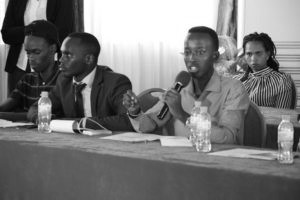On a warm Wednesday afternoon, a group of neighbours came together in Rwanda’s Bugesera district to share, talk and – most importantly – listen to one another in the name of peacebuilding.
They aren’t neighbours in a conventional sense; in fact, half of them are Rwandans and the other half Burundians. Despite living in different countries, these two communities often interact because they live along an artificial line drawn across the land one hundred years ago. Sometimes the interactions are positive, but other times, living in such close proximity can cause tension and even lead to violence.
That’s why the Great Lakes Peace-Building Program is so important for these two communities. Wednesday marked the initiation of the first permanent cross-border dialogue space in the Great Lakes Region, where people living in border-regions can come together in the spirit of respect and mutual understanding.
“We look alike, we talk the same language, we share the same air, sunshine and our children get married to each other. In addition, we were colonized by the same nation, got our independence the same day and share the sad and happy times,” said one participant during Wednesday’s dialogue.
It is that type of sentiment that the Great Lakes Peace-Building Program aims to draw out of its permanent dialogue spaces. Working in border communities in the Great Lakes Region that have struggled with outbursts of violence since independence in the 1960s, the program promotes education and dialogue as a means of preventing conflict and increasing understanding among parties that may have competing interests. Led by Interpeace, the program has brought together with six local NGOs in Rwanda, Burundi and the Democratic Republic of the Congo to teach participants to tolerate differences and to resolve conflict in non-violent ways.
Wednesdays’ dialogue, hosted by Never Again Rwanda, Interpeace and CENAP in the town of Nyamata, Bugesera district, was the first meeting between 15 residents of Bugesera, Rwanda and their 15 participants from neighbouring Kirundo, Burundi, just 50 kilometers to the south.
The Rwandans gave a very enthusiastic welcome to the Burundian participants, setting a positive tone for the dialogue to begin. Throughout the course of the meeting, the participants discussed the theme of cross-border population movements, and identified some of the positive aspects of the topic, as well as some of the issues that arise from these movements.
“Cross-border movements are crucial for citizens of the two sides of the border; people cross the border for many purposes, including business, visiting friends and relatives, access to health facilities, employment,” a participant said.
However, the group agreed that illegal cross border movements are causing problems for the Bugesera-Kirondo community. Issues like fraud, child labour, a flow of stolen materials have arisen and lead to tension, suspicion and mistrust between Rwandans and Burundians living in the area.
For example, Burundians were particularly concerned about children dropping out of school to cross the border to Rwanda, looking for work in Rwandan homes. The perception that while Rwandan students were going to school and being educated, while Burundian children were working in the homes where those students lived, has created tension between the two communities.
Through the dialogue, the Rwandans were given the opportunity demonstrate that there were some nuances to the perception of the Burundian child labourers vs. the privileged Rwandan child students. They expressed that this wasn’t the case with all the children who crossed the border and informed the Burundians that some of the children had been taken into Rwandan families and were supported to get their education, with a number of them graduating from primary and secondary schools. Still, the group acknowledged that the issue of child labour was a serious problem that should be addressed.
By listening to one another and mutually agreeing on the appropriate solution for the issue, the group proposed that there should be more awareness and sensitivity to the issue of child labour in Bugesera, and that through advocacy and working with the local leaders, that addressing child labour should be a priority for the community. In particular, the group found a way that they could address the issue immediately – through the network they had just formed among themselves.
The plan, which is currently being implemented, is that when the Rwandan members of the dialogue group become aware of a Burundian child who has crossed the border looking for work, they will contact one of the Burundian participants and come up with a plan for returning the child to his or her home. This is just one of a number of grassroots initiatives that the group came up with to improve cross-border relations, through the participatory nature of the Great Lakes Peace-Building Program.
The group is set to meet again at the end of April, but Burundians will be the host this time, with Rwandans meeting them in Kirundo.


